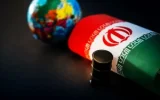
Abadan Petrochemical, as the first petrochemical complex in Iran, is facing a paradox between “oldness” and “efficiency” today, on the eve of its sixth decade of operation. This company, which was once a symbol of Iran’s industrial modernity, is now struggling with structural challenges in the production chain and a food supply crisis, despite its 14 percent share in the country’s PVC supply; a situation that has tied the survival of this strategic unit to ownership reform and infrastructure modernization.

The Russian secretary of the Iran-Russia Joint Economic Commission announced the possibility of exchanging more than 2,000 items of goods and services between the two countries, saying: "According to the latest statistics, the volume of trade between the two countries has reached 4.7 billion dollars."

Within this framework, the southern oil-rich regions, by simultaneously focusing on maintaining production, developing fields, improving operational readiness, and increasing the resilience of facilities, were able to increase the average daily crude oil production by about 100,000 barrels in the operational scope of the Karun, Marun, Aghajari, Masjed Soliman, and Gachsaran oil and gas exploitation companies, while compensating for the natural decline in reservoirs; an increase that was the result of a series of field, technical, and managerial measures and highlights the decisive role of this company in the sustainable supply of energy to the country.

The Minister of Oil considered the 19th meeting of the Iran-Russia Joint Commission an important opportunity to deepen strategic relations between Tehran and Moscow and emphasized: Strengthening economic cooperation between Iran and Russia can play an effective role in enhancing the economic capabilities of the two countries and forming an order based on common interests.

The CEO of the National Iranian Oil Refining and Distribution Company announced a 4% decrease in oil and gas consumption in 1404 (2025). He said: Last year, one billion dollars was spent on importing oil and gas into the country, but this year passed without any imports.

Production in Khorasan, Lordegan, Kermanshah, Zagros, Sabalan, Kimia Pars, and many other urea and methanol petrochemical plants has dropped to zero; why? Because the only prescription of all governments to overcome the gas crisis is to close the gas valve of petrochemical plants.

Central Bank statistics indicate a 1.1% growth in oil production and exports in the first half of 1404; a growth achieved during an economic recession and alongside a 0.6% decrease in the country's gross domestic product.

Estimates by the Kepler Institute show that China purchased over 80% of Iran's exported oil in 2025, with daily imports averaging around 1.38 million barrels, equivalent to approximately 13% of China's total seaborne oil imports.

Mantro stated at the European Parliament meeting with the EU's Foreign Policy Chief, Kajsa Kallas, that Trump is after Iran's oil.

The investment and business manager of the National Iranian Oil Company said: With the implementation of rapid equipment projects for factory construction (skid-mounted) under the public-private partnership model, 12% of the country's crude oil processing is carried out by the private non-governmental sector.










